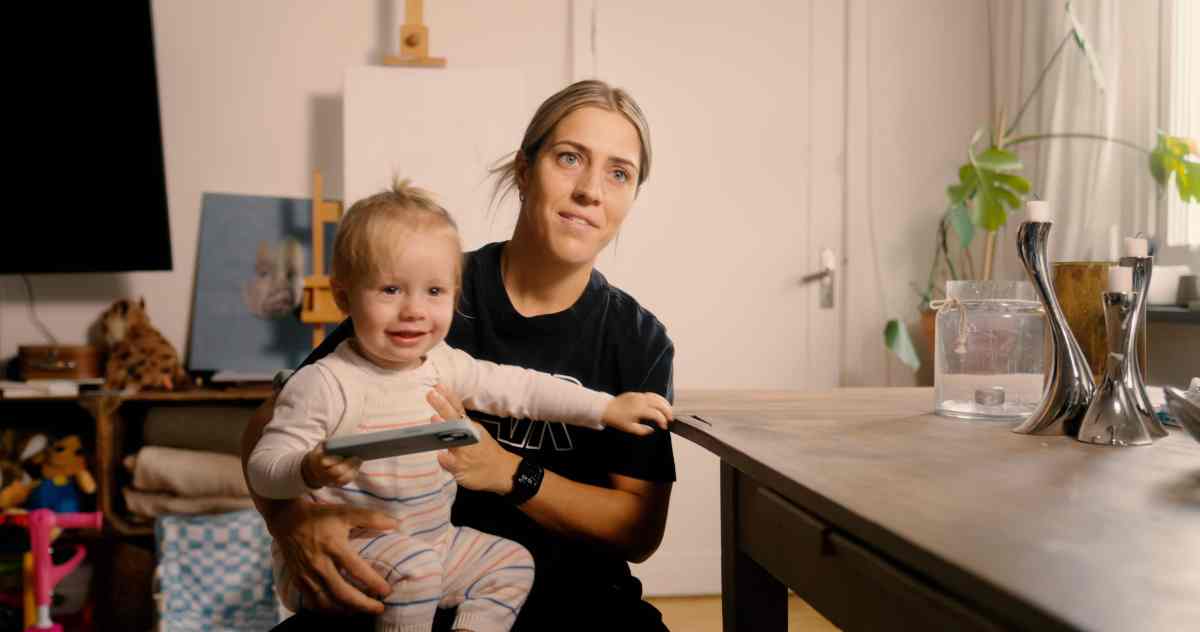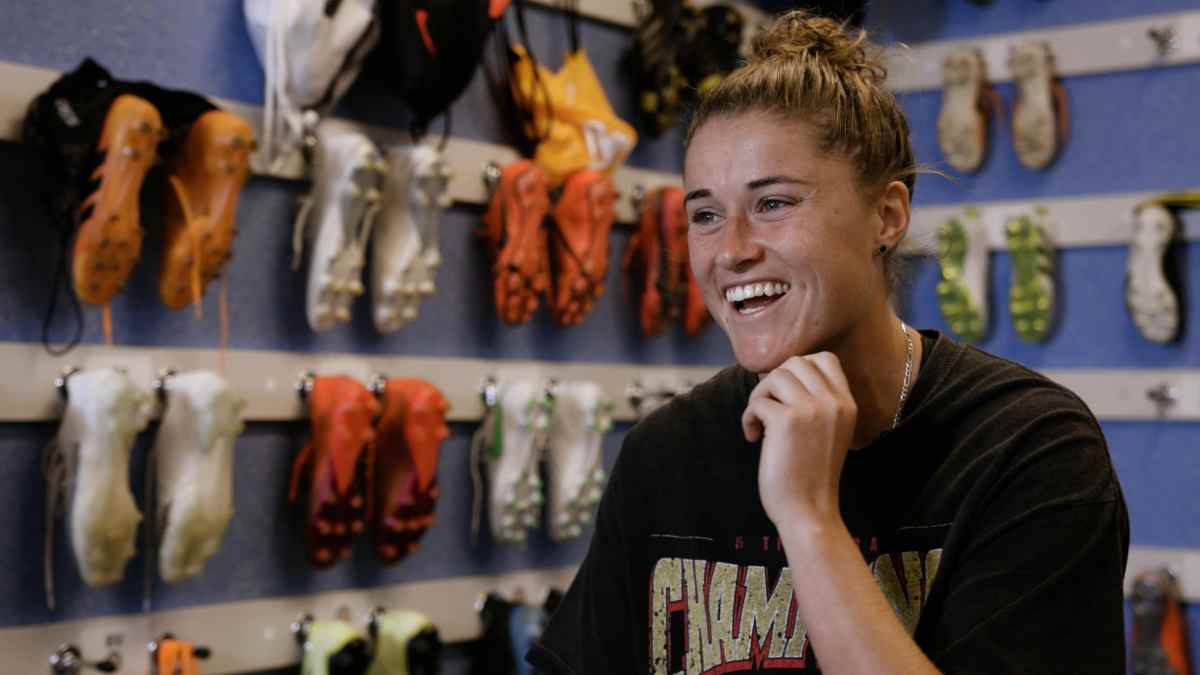In the lead-up to the Paris Olympics next month, and in the close wake of the Matildas’ wildly successful FIFA Women’s World Cup foray on home soil in 2023, Stan has just released Trailblazers – a 38-minute Stan Original documentary covering the history of the rise of women’s football in Australia. A punchy appetiser designed to whet our national appetite for what’s to come.
Co-directed and produced by Maggie Miles and Maggie Eudes, the documentary is mostly composed of talking head interviews – on the pitch, in the stands, at home holding a baby. We hear from the number one capped player and first team captain, Julie Dolan (1979), who reflects on the early days of the sport, through to current Matildas captain Sam Kerr – and many in between.
Watch the trailer for Trailblazers
How far we’ve come
The history of the game, from the ban of women’s football in the UK following World War II to the revival of the game in Australia in the late 70s, is filled in by players’ reflections, as well as commentary from Samantha Lewis, the women’s football journalist. Lewis explains that although in Australia we didn’t have an official ban on women’s football post-war, there was effectively a ‘cultural ban’ – ‘an attitude’ that football wasn’t for women.
Lewis’s commentary is filled in with historic footage, player’s reflections and cuttings of the outdated and downright ridiculous views expressed in newspaper articles at the time (for example, that because women are ‘round’ their movements should also be round, and not angular) that serve to demonstrate how far the sport – and the nation – has come.
Read: Matildas doco Trailblazers set to impact girls and women in sport
Some of the stories are simply wild – Moya Dodd AO, former Vice Captain and one of the first women ever elected to the FIFA board (2013-2016) recalls taking a rice cooker on tour in the 80s to ensure she ate a decent meal. ‘It was all sticky tape and bits of string’, she says. Other players, such as Dolan, talk about how, in the early days, the players not only had to train and play while juggling families and jobs, but had to sew their own patches on their uniforms, fundraise for themselves and promote their own games.
Dodd, as one of the players involved in the first FIFA international women’s tournament in 1988 (which paved the way for the inaugural FIFA Women’s World Cup in 1991) reflects on how players had to pay $850 each to play on the team. It’s enough to fill you with outrage while simultaneously marvelling at the incredible fortitude and resilience of these women.
The beautiful game
Number 30 capped player Karen Menzies (1988), the national team’s first Indigenous player, attributes finding her passion for football with still being alive today. After the personal trauma of being forcibly removed from her family and brought up in a home as a member of the Stolen Generation, her football gave her purpose – ‘Everything about the game is beautiful’, she says in the opening of the film, ‘I understand why it’s called the beautiful game.’
Other players talk about how the discouragement they faced in coming to play football spurred them on to play. ‘It takes a certain feistiness and energy to want to play something you’ve been told you shouldn’t do’, says Dodd. Melissa Barbieri tells us that she has ‘a hatred for people trying to tell me what to do.’ That if someone told her she can’t play football because she is a girl, then, it meant she had to do it. It’s clear that it was this sort of grit, determination and stubbornness that were required characteristics of these players – enabling them to surmount the challenges they encountered at each turn in their career.

There are some pretty naff connective elements in the film, where split screens separate the interviewees, with their speaking lines directed at the camera. All I can see is the filmmaker telling these superstar mavericks of the game ‘so, can you look down the barrel and say, “Never say die”? It’ll look cool’. It’s a bit cringe, but look – I’ll forgive it. These women are heroes. Even if it feels a bit like a dorky commercial at times.
It’s mindboggling to think how many generations of sportswomen have not only had to manage the challenges of being elite sportspeople, but do it alongside fundraising, car boot sales, earning a living from other jobs – and potentially not even getting paid from their sport.
Players involved in the 2015 strike, which led to the team not playing against the previous year’s World Cup winning US team, reflect on how their action – which gained significant media attention across the country at the time – paved the way for their collective bargaining agreement, and the world first equal pay agreement for the men’s and women’s football teams, established in 2019.
Read: Stan: new shows streaming this week
Just enough good stuff
Despite feeling a bit like it’s been designed to be cut up as a trailer, Trailblazers is a pithily told story of the women who – for passion of the game – fought enormous challenges to play football for Australia, paving the way for the rise of women’s football in this country. It’s the stuff that gives you chills. And as someone who has never followed women’s football until getting swept up in the spirit of the sport in last year’s World Cup, Trailblazers was a decent potted history and a reminder that we should all have these women’s names at the top of our collective conscious – Julie Dolan, Karen Menzies, Maya Dodd and many more – alongside the Sam Kerrs, Mary Fowlers and Ellie Carpenters.
It feels like football in this country has finally flourished and captured the national spirit, after playing second fiddle to that other football, AFL, for so long. After Australia and New Zealand’s successful bid for the 2023 FIFA Women’s World Cup and the Matildas’ golden run of win after win before finishing fourth in that competition, the women’s national football team took our collective breath away. As Trailblazers tells us, 11.5 million people tuned into watch the Matildas play in that World Cup, in what has set the record as the biggest TV event in Australian TV history.
Trailblazers, as intended,is great snack-sized pre-Olympics viewing, to get you in the mood to shake that green and gold. Because there’s nothing that puts more skin in the game than a tough origin story – and we love to see our national teams win. Go Matildas!
Trailblazers is available to stream on Stan now.
Actors:
Sam Kerr, Katrina Gorry, Karen Menzies, Julie Dolan, Mary Fowlers, Ellie Carpenter, Moya Dodd, Teagan Micah
Director:
Maggie Miles and Maggie Eudes
Format: Movie
Country: Australia
Release: 04 June 2024





